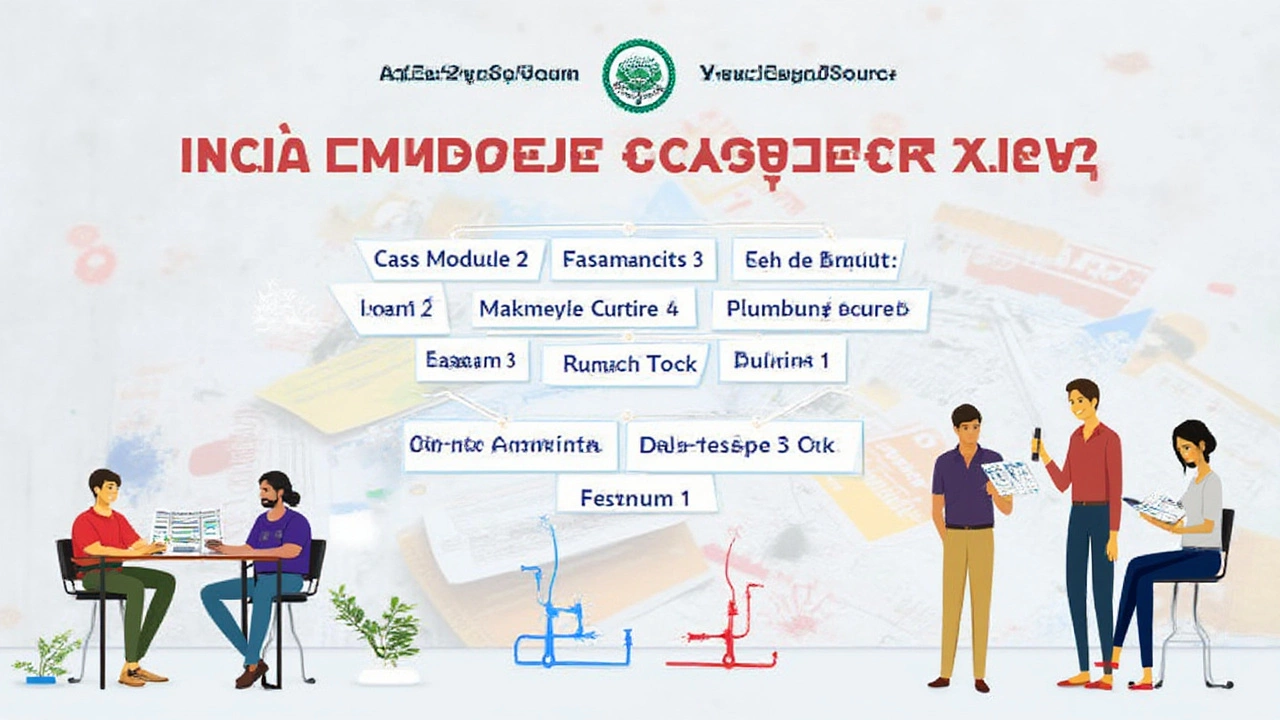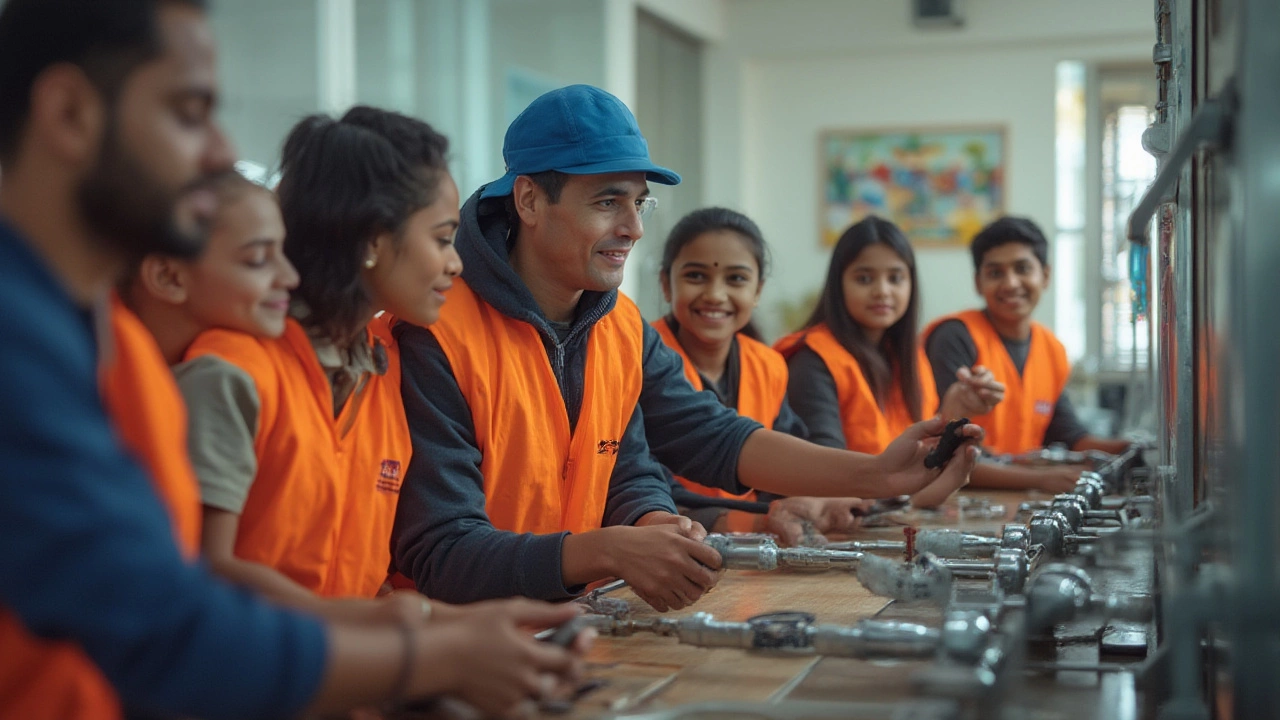Best Plumbing Course: How to Choose the Right Path for Career Success
Let’s be real for a second: everyone’s house has pipes, and when those pipes go wrong, they need someone smart (and brave) enough to crawl under the kitchen sink and fix it. That someone could be you, but there’s a catch—picking the right best plumbing course isn’t a simple tap-and-go job. The plumbing world isn’t what it was fifty years ago. These days, you’ve got high-tech tools, new building rules, eco-friendly systems, plus, everyone wants their bathroom to look like a luxury spa. It all starts with the right education. But with so many different courses out there—apprenticeships, diplomas, short masterclasses, even online video lessons—it’s easy to get lost. Ever wondered which training will actually land you jobs and help you avoid rookie mistakes that could cost you thousands or worse, drown your reputation? That’s the question we’re untangling here.
Understanding Plumbing Training: What Makes a Course “Best”?
There’s no one-size-fits-all answer in the world of plumbing training courses. Sure, some claim to be the “top” course or the “definitive” program, but what’s best depends on what you want out of your career. Keen to run your own business some day? Want to work for a big company or specialise in eco-friendly systems? Your pathway might look different from your mate’s. Let’s start at the basics: the core goal is to get skills and credentials that employers and customers actually respect. In most countries (including here in New Zealand), you must have a formal qualification to legally work as a plumber. We’re not talking about a quick online quiz—it takes serious hands-on training.
In New Zealand, the New Zealand Certificate in Plumbing (Level 4) is the benchmark qualification. Most people get there through an apprenticeship that runs for about four years. During that time, you’ll combine work experience with block courses at a polytech or trade school like Unitec or Wintec. While this setup is common, some start with a pre-trade course—a one-year full-time program that gives you a taste of real plumbing and makes you more appealing to employers for apprenticeship roles. Important tip: a pre-trade course is usually voluntary, but it can give you an edge, especially if you don’t have any connections in the industry.
In Australia and the UK, the story is similar but the course names change. Australians might look for the Certificate III in Plumbing, while in the UK, it’s the Level 2 or Level 3 Diploma in Plumbing. But globally, there’s a pattern: you need a mix of classroom learning (to get the basics right) and workplace training (to learn how to handle surprises). The “best” course is the one that gives you the legal ticket (the formal qualification), practical real-world experience, and the flexibility to adapt as technology in plumbing evolves. Don’t fall for ads that promise you can be a plumber in a month. If it sounds too good to be true, it is.
Main Types of Plumbing Courses: Pros, Cons, and Paths
The three main categories of plumbing courses are: Apprenticeships, Pre-trade/Vocational Courses, and Short Specialist Workshops. Picking your best match depends on how you learn and where you want your career to go. Here’s a breakdown so you know where you stand.
- Apprenticeships: Classic entry point. You learn on the job under a licensed plumber, get paid while you train, and also attend block courses. At the end, you’re fully qualified and (usually) have a job lined up. The big upside? You never feel stuck in a boring classroom, and you build real work connections from day one. The catch: you need to find a plumber or business willing to hire and support you—tricky if you don’t know anyone in the trade.
- Pre-trade/Vocational Courses: Generally a one-year commitment at a technical institute, this course gives you the basics—safety, hand tools, systems, basic maths, and customer skills. Think of it as plumbing boot camp. It won’t make you a qualified plumber by itself, but it gets you noticed by employers (or helps you decide if dealing with blocked toilets is really your calling). Schools often help their graduates find apprenticeship placements.
- Short Specialist Workshops: Designed for upskilling. Already a plumber and want to learn about solar hot water, water conservation, or underfloor heating? These masterclasses can add serious value. But if you’re a total beginner, you can’t skip the core training and jump right to these workshops.
There’s also the option of online theory courses. These are handy for learning the basics or prepping for exams, but you won’t get hands-on skills or legal recognition from them alone. No YouTube video is going to prepare you for fixing a gas leak in a windy Auckland winter! If budget is a concern, apprenticeships are a win because they pay a wage and you avoid giant student loans. But if you’re in a rush or want a head start before knocking on doors for apprenticeships, a short pre-trade course can be a savvy investment—especially since many future employers love hiring students from these programs.

What Employers and Clients Really Want
You’ve probably seen slick ads for private courses promising you’ll “become a master plumber in weeks.” Ignore the hype. Every employer I know (and clients too) cares about actual skills, a recognised credential, and a driven attitude—not the fanciest piece of paper. The nuts and bolts? Most plumbing businesses look for someone with a formal apprenticeship under their belt. That’s the golden ticket. Don’t forget: safety is king in plumbing. Working with gas lines or complex water systems without training isn’t just risky for you, it’s illegal and potentially deadly.
Soft skills are just as important as knowing your way around a U-bend. Communication matters. Can you explain a tricky repair to a stressed-out homeowner? Do you turn up on time and keep your van tidy? Clients notice. The next step is proof of your skills: a New Zealand practising license, police check, and good references. Independent plumbers and small business owners especially want trainees who already understand customer service, can handle a good work ethic, and don’t shy away from dirty work when it’s busy. Here’s a key stat: in New Zealand, licensed plumbers earn a median wage of about NZD $29 per hour, but top-tier plumbers easily pull in $40 or more, especially after a few years in the trade.
A fun fact? There’s been a huge rise in demand for plumbers who know about sustainability. If you can install water-saving systems, solar hot water, or greywater recycling, you’re way ahead. Employers now like to see candidates who care about the environment and are up-to-date with green plumbing. Those kinds of extras tend to be taught in short courses after you get your basic ticket, but some trade schools are adding them into their main curricula. Ask about this when you enrol!
Plumbing Course Costs, Duration, and What to Watch Out For
Cost and time can be deal-breakers. Apprenticeships are usually 3-4 years long, with no tuition fee but a moderate training levy (think around NZD $500-700 per year with a substantial wage throughout). Pre-trade courses here are typically NZD $6,000-$9,000 up front for a year. If you’re dead set on plumbing but don’t want years of tuition debt, going straight into an apprenticeship right after school is cost-effective. If you have a bit saved up and want a confidence boost before applying, the pre-trade path works a treat.
Check if the institute is actually accredited. If it’s not listed with NZQA (New Zealand Qualifications Authority) or similar, walk away. You want the course to count towards your practicing license or lead directly to an apprenticeship. Sometimes private colleges overpromise. Ask around locally—other trainees, working plumbers, even at your local hardware store. Word gets out fast if a course is all talk and no results. Good schools are transparent about job placements and pass rates. Don’t be shy: press them for this info. You wouldn’t buy dodgy tools, so don’t settle for a dodgy course.
| Course Type | Duration | Typical Cost (NZD) | Leads To |
|---|---|---|---|
| Apprenticeship | 3-4 years | Training levy (~$500-$700/year) | NZ Certificate in Plumbing (Level 4) |
| Pre-trade Course | 1 year | $6,000-$9,000 (may be Fees Free) | Entry to apprenticeship |
| Short Specialist Workshop | 1-5 days | $350-$1,200 | Post-qualification upskilling |
Thinking of online options from overseas? Watch out—many aren’t valid here, and you might have to redo training from scratch. Only trust courses clearly recognised by local authorities. Another watch-out: some companies offer “guaranteed” jobs after finishing, but if you read the fine print, it’s rarely a guarantee. Talk to recent graduates if you can and find out their experience landing a job.

Tips For Choosing the Right Plumbing Course for You
So, after weighing it all up, how do you land on a course that works for you? Here are some tried-and-true tips:
- Match your learning style: Thrive on being hands-on? Apprenticeship is spot on. Like structured classroom basics first? Pre-trade courses are your friend.
- Future-proof your career: Plumbing’s getting high-tech. Robotics and smart water systems are already here. Look for programs that talk about new tech and sustainability—this will definitely pay off.
- Check local recognition: The best course is worthless if employers don’t accept your certificate. Double-check that it’s NZQA or industry-approved.
- Ask about work placement rates: Good schools brag about high apprenticeship placement rates. If they don’t, dig deeper.
- Interview your future trainers: When you tour a school, ask the lecturers about their years “on the tools.” If your future teacher hasn’t fixed a leaky pipe in twenty years, that’s a red flag.
- Network early: Get to know local plumbers. Do work experience, ask questions at your local plumber’s merchant, and be present on trade forums. Many jobs are filled before they’re even advertised.
- Think beyond the basics: Plumbing can take you to gas fitting, drain laying, solar energy, or even business ownership. Choose a course that sets you up with multiple pathways, not one dead-end certificate.
- Remember your goals: Some jump in because they want a job fast. Others are looking for steady pay for their family. Some want their own business. Keep *your* goal in mind and pick the training that fits.
- Don’t forget safety standards: Plumbing isn’t only about water. You might deal with hazardous materials, gas, hot water—your course must cover all safety rules.
One more thing: funding. In New Zealand, many pre-trade plumbing courses are covered by the ‘Fees Free’ scheme for new learners, and apprenticeships are often subsidised as part of skills shortages. If you’re retraining later in life, there are extra grants and scholarships around. If money is tight, talk to your local polytech student support for advice. And if you’re still at school, see if they offer Gateway programs where you can try out plumbing while finishing your NCEA (that’s a big box ticked for employers looking for keen trainees).
So what’s the big takeaway here? If you want a stable job, skill variety, and the satisfaction of fixing problems others can’t handle, plumbing is a solid call. Just make sure your journey starts with real-world, recognised training. The best course isn’t always the most expensive or the most popular. It’s the one that gives you actual practical skills, a legal pathway, and a bit of room for your own ambitions. Do your homework, ask blunt questions, and never settle for shortcuts. That’s how you build a career that’s not only leak-free, but future-proof.





